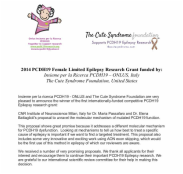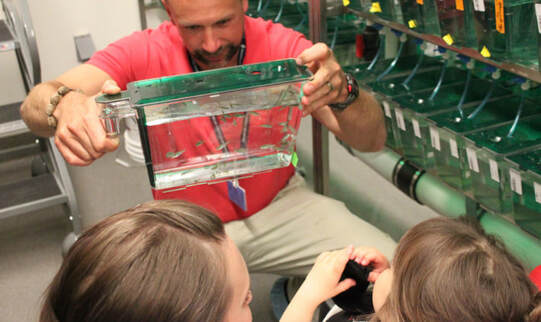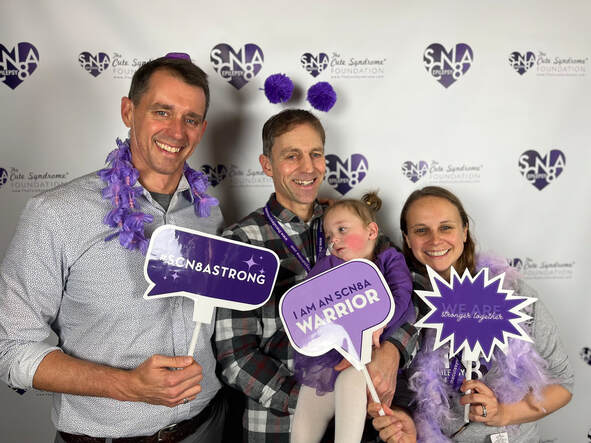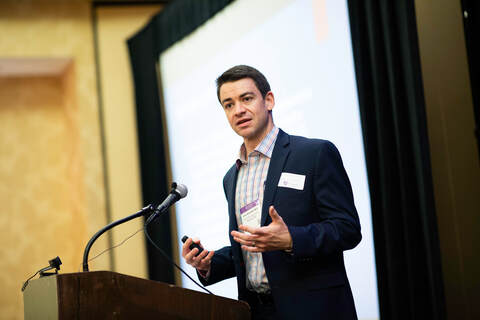SCN8A Grants
2023 Grant: Dr. Chris Dulla, Tufts University
2022 Grant: Dr. Jillian McKee, Children's Hospital of Philadelphia
2021 Grant: Dr. Ian Wenker, University of Virginia
2020 Grant: Dr. Elena Gardella, The Danish Epilepsy Center
2019 Grants: Dr. Benjamin Prosser, University of Pennsylvania & Dr. Michael Hammer, University of Arizona
2018 Grant: Dr. John Schreiber, Children's National Medical Center
2017 Grant: Dr. Ted Cummins, Purdue University Indianapolis & Dr. James Marrs, Indiana University School of Medicine
2016 Grant: Dr. Miriam Meisler, University of Michigan
2015 Grant: Dr. Michael Hammer, University of Arizona
PCDH19 Grants
2015 International Grant: Dr. Jack Parent, University of Michigan
2014 International Grant: Dr. Maria Passafaro, CNR Institute of Neuroscience
2014 Grant: Dr. Annapurna Poduri, Boston Children's Hospital
2023 Grant: Dr. Chris Dulla, Tufts University
2022 Grant: Dr. Jillian McKee, Children's Hospital of Philadelphia
2021 Grant: Dr. Ian Wenker, University of Virginia
2020 Grant: Dr. Elena Gardella, The Danish Epilepsy Center
2019 Grants: Dr. Benjamin Prosser, University of Pennsylvania & Dr. Michael Hammer, University of Arizona
2018 Grant: Dr. John Schreiber, Children's National Medical Center
2017 Grant: Dr. Ted Cummins, Purdue University Indianapolis & Dr. James Marrs, Indiana University School of Medicine
2016 Grant: Dr. Miriam Meisler, University of Michigan
2015 Grant: Dr. Michael Hammer, University of Arizona
PCDH19 Grants
2015 International Grant: Dr. Jack Parent, University of Michigan
2014 International Grant: Dr. Maria Passafaro, CNR Institute of Neuroscience
2014 Grant: Dr. Annapurna Poduri, Boston Children's Hospital
SCN8A Grants
The 2023 SCN8A Grant is Awarded to: Chris Dulla, PhD, Tufts University
The Cute Syndrome Foundation is thrilled to announce the awarding of an SCN8A seed grant to Chris Dulla, PhD, and Madeleine Oudin, PhD, of Tufts University, along with Chris Burge, PhD, of MIT for “Validating a new mouse model of SCN8A infantile spasms and epilepsy”. This grant has been supported in partnership with the American Epilepsy Society and the Cute Syndrome Foundation.
These funds will support PhD student Haley Dame and her work in characterizing the new SCN8A mouse model their lab has developed, as well as testing out the impact of disease-correcting ASOs for SCN8A.
This project holds a special significance for Dr. Oudin and Dr. Burge as their daughter Margot is affected by SCN8A epilepsy.
Dr. Oudin said of their work:
“We are really excited to be starting new SCN8A research at Tufts University. While Prof. Chris Dulla has been studying epilepsy for 20 years, he has never worked on ion channel-based epilepsies. The AES Seed grant gives him the opportunity to bring his extensive knowledge and expertise to the SCN8A community.”
These funds will support PhD student Haley Dame and her work in characterizing the new SCN8A mouse model their lab has developed, as well as testing out the impact of disease-correcting ASOs for SCN8A.
This project holds a special significance for Dr. Oudin and Dr. Burge as their daughter Margot is affected by SCN8A epilepsy.
Dr. Oudin said of their work:
“We are really excited to be starting new SCN8A research at Tufts University. While Prof. Chris Dulla has been studying epilepsy for 20 years, he has never worked on ion channel-based epilepsies. The AES Seed grant gives him the opportunity to bring his extensive knowledge and expertise to the SCN8A community.”
The 2022 SCN8A Grant is Awarded to: Jillian McKee, MD, PhD, Children's Hospital of Philadelphia
 Jillian McKee, MD, PhD
Jillian McKee, MD, PhD
The Cute Syndrome Foundation is thrilled to announce the granting of a Rare Epilepsy Partnership Award to Jillian McKee, MD, PhD at The Children’s Hospital of Philadelphia for her project titled “Reconstructing the longitudinal disease history in SCN8A-related disorders”.
The one-year grant is funded in partnership with CURE Epilepsy, whose portion is sponsored by the Robert Withrow Wier Fund.
The one-year grant is funded in partnership with CURE Epilepsy, whose portion is sponsored by the Robert Withrow Wier Fund.
The 2021 SCN8A Grant is Awarded to: Ian Wenker, PhD, University of Virginia
 Ian Wenker, Ph.D.
Ian Wenker, Ph.D.
The Cute Syndrome Foundation is thrilled to share the awarding of a research grant to Ian Wenker, Ph.D, of the University of Virginia to further research related to SUDEP in SCN8A epilepsy. Sudden Unexpected Death in Epilepsy (SUDEP) is a devastating and unfortunately all-to-common outcome for those with epilepsy. Patients with SCN8A epilepsy have heightened risk of SUDEP compared to the general epilepsy population.
Ian Wenker said of his work:
“There is increasing evidence that apnea (breathing cessation) is the primary cause of death from SUDEP in many cases. In a mouse model of SCN8A epilepsy, I have shown that apnea that occurs during tonic seizures and SUDEP occurs when breathing does not recover postictally. I have also found that the main breathing muscle responsible for inhalation (i.e., the diaphragm) is tonically contracted during apnea.
I have now also shown that inhibition of the forebrain does not affect this apnea, and now will investigate relevant brainstem neuronal groups that regulate breathing. The normal rhythm and pattern of breathing (i.e., alternating inspiratory and expiratory phases) is created by what is known as the “inspiratory oscillator” in the ventral medulla oblongata. This has led me to hypothesize that apnea during tonic seizures occurs due to tonic inspiratory activity generated by pathological tonic activation of the inspiratory oscillator.
Thus, I intend to determine the state of the inspiratory oscillator during apnea. I will test whether tonic inspiratory activity causes apnea by optogenetically stimulating the Bötzinger Complex, a group of expiratory neurons that powerfully inhibit the inspiratory oscillator, which I anticipate will cause expiration and restore normal inspiratory oscillation. The identification of the neural circuitry that causes this potentially-fatal apnea will serve as targets for future SUDEP prevention therapies.”
Ian Wenker said of his work:
“There is increasing evidence that apnea (breathing cessation) is the primary cause of death from SUDEP in many cases. In a mouse model of SCN8A epilepsy, I have shown that apnea that occurs during tonic seizures and SUDEP occurs when breathing does not recover postictally. I have also found that the main breathing muscle responsible for inhalation (i.e., the diaphragm) is tonically contracted during apnea.
I have now also shown that inhibition of the forebrain does not affect this apnea, and now will investigate relevant brainstem neuronal groups that regulate breathing. The normal rhythm and pattern of breathing (i.e., alternating inspiratory and expiratory phases) is created by what is known as the “inspiratory oscillator” in the ventral medulla oblongata. This has led me to hypothesize that apnea during tonic seizures occurs due to tonic inspiratory activity generated by pathological tonic activation of the inspiratory oscillator.
Thus, I intend to determine the state of the inspiratory oscillator during apnea. I will test whether tonic inspiratory activity causes apnea by optogenetically stimulating the Bötzinger Complex, a group of expiratory neurons that powerfully inhibit the inspiratory oscillator, which I anticipate will cause expiration and restore normal inspiratory oscillation. The identification of the neural circuitry that causes this potentially-fatal apnea will serve as targets for future SUDEP prevention therapies.”
The 2020 SCN8A Grant is Awarded to: The Danish Epilepsy Center and Primary Investigator Elena Gardella, MD, PhD
 Elena Gardella, M.D., Ph.D.
Elena Gardella, M.D., Ph.D.
The Cute Syndrome Foundation and SCN8A Italia are thrilled to announce that in late 2020 we co-awarded a €9,000 Euro grant to The Danish Epilepsy Center and Primary Investigator Dr. Elena Gardella to support their 430 patient registry and natural disease evolution. The grant funds the cost of a research fellow, Francesca Furia, to update information on approximately 400 of the 430 patients included in their SCN8A Registry. We are so thrilled to support he important work being undertaken by Dr. Gardella and the team at the Danish Epilepsy Center! We are also thrilled that the collaborative partnership that we have established between TCSF and our European SCN8A partners is yielding such positive and measurable results already.
2019 AES Co-Funded SCN8A Seed Grants Are Awarded to: Benjamin Prosser, PhD, University of Pennsylvania and Michael Hammer, PhD, University of Arizona
The Cute Syndrome Foundation is thrilled to announce the awarding of two SCN8A seed grants:
|
The first grant, "Targeting micro-RNAs to treat genetic epilepsies," is awarded to Benjamin Prosser, PhD; Ingo Helbig, MD; and Beverly Davidson, PhD of the University of Pennsylvania. This grant has been supported in a partnership with American Epilepsy Society, The Cute Syndrome Foundation, and SLC6A1 Connect.
The second grant, "Testing the role of early mitochondrial dysfunction in SCN8A epilepsy" is awarded to Michael Hammer, PhD, and Fei Yin, PhD of the University of Arizona. This grant has been supported in a partnership with American Epilepsy Society and The Cute Syndrome Foundation. |
The 2018 SCN8A Grant is Awarded to: John Schreiber, MD, of Children's National Medical Center
The Cute Syndrome Foundation is thrilled to share the awarding of a clinical research grant, originally announced at our 2018 SCN8A Clinician, Researcher, and Family Gathering, to Dr. John Schreiber and Children's National. The vision for this grant developed after the devastating loss of two infants in our SCN8A community last fall, and we are grateful to Dr. Schreiber for working with us to look for ways to improve access to expert advice in the treatment of individuals with SCN8A.
The official announcement follows:
Children’s National Medical Center and The Cute Syndrome Foundation are delighted to enter a 6-month pilot research project to evaluate education and access to expert care for SCN8A. Led by Dr. John Schreiber, Neurologist and Assistant Professor of Neurology and Pediatrics at George Washington University, Children’s National will develop a focused effort to provide families and clinicians with the Clinician Information and Reference Guide—developed by The Cute Syndrome Foundation— and attempt to uncover the barriers to accessing expert advice. The study will result in a better understanding of those factors that prevent access to consensus recommendations and expert care. It will also increase provider knowledge of SCN8A-related disorders, improve utilization of appropriate anti-seizure therapies, and may eventually reduce mortality. As the first ever study of its kind, this pilot project will pave the way for future interventions that will raise the profile of SCN8A-related disorders, facilitate collaborative care and research, improve patient outcomes, and reduce mortality.
Thank you, Dr. Schreiber, for your dedication to the SCN8A community!
2020 Update: Impact Report
The official announcement follows:
Children’s National Medical Center and The Cute Syndrome Foundation are delighted to enter a 6-month pilot research project to evaluate education and access to expert care for SCN8A. Led by Dr. John Schreiber, Neurologist and Assistant Professor of Neurology and Pediatrics at George Washington University, Children’s National will develop a focused effort to provide families and clinicians with the Clinician Information and Reference Guide—developed by The Cute Syndrome Foundation— and attempt to uncover the barriers to accessing expert advice. The study will result in a better understanding of those factors that prevent access to consensus recommendations and expert care. It will also increase provider knowledge of SCN8A-related disorders, improve utilization of appropriate anti-seizure therapies, and may eventually reduce mortality. As the first ever study of its kind, this pilot project will pave the way for future interventions that will raise the profile of SCN8A-related disorders, facilitate collaborative care and research, improve patient outcomes, and reduce mortality.
Thank you, Dr. Schreiber, for your dedication to the SCN8A community!
2020 Update: Impact Report
The 2017 SCN8A Grant is Awarded to: Ted Cummins, PhD, Purdue University Indianapolis, and James Marrs, PhD, of Indiana University School of Medicine
It comes with much excitement and hope for our children's futures that we share with you the details of The Cute Syndrome Foundation and Ajude o Rafa - Epilepsia SCN8A's joint $40,000 research granting process.
After reviewing a number of highly competitive applications, we, along with the help of our Scientific Advisory Board, have selected Ted Cummins, PhD and James Marrs, PhD, of Indiana University-Purdue University Indianapolis and Indiana University School of Medicine for their proposal to incorporate SCN8A into zebrafish and test the effects of various pharmaceutical compounds on seizures in their fish model.
Dr Cummins explains the work, "Mutations in SCN8A can lead to seizures and other serious medical problems. Some patients respond to available drugs, but many do not achieve adequate therapy or suffer side effects. Better treatments are needed. We propose to develop zebrafish models of several different SCN8A mutations. Zebrafish models can be inexpensively and rapidly developed compared to mouse models. They can be used for fast screening of potential drugs in automated assays. Because this high throughput screening is done with intact vertebrate animals, it has tremendous advantages over test-tube and cell-based screens. Our long-term vision is to develop a specific model for each SCN8A mutation to help identify personalized treatments for patients with specific SCN8A mutation."
We are especially excited as this introduces into our community a new animal model for SCN8A that has never before been used in our population. This is very promising work and we are excited for Dr Cummins' lab to begin the project!
We were very fortunate to have had the assistance of a very well-rounded 2017 9-member Scientific Advisory Board made up of SCN8A researchers, clinicians, and parents in making this decision and look forward to the information our community will gain as a result of the grant. A special thanks for their contribution and guidance:
After reviewing a number of highly competitive applications, we, along with the help of our Scientific Advisory Board, have selected Ted Cummins, PhD and James Marrs, PhD, of Indiana University-Purdue University Indianapolis and Indiana University School of Medicine for their proposal to incorporate SCN8A into zebrafish and test the effects of various pharmaceutical compounds on seizures in their fish model.
Dr Cummins explains the work, "Mutations in SCN8A can lead to seizures and other serious medical problems. Some patients respond to available drugs, but many do not achieve adequate therapy or suffer side effects. Better treatments are needed. We propose to develop zebrafish models of several different SCN8A mutations. Zebrafish models can be inexpensively and rapidly developed compared to mouse models. They can be used for fast screening of potential drugs in automated assays. Because this high throughput screening is done with intact vertebrate animals, it has tremendous advantages over test-tube and cell-based screens. Our long-term vision is to develop a specific model for each SCN8A mutation to help identify personalized treatments for patients with specific SCN8A mutation."
We are especially excited as this introduces into our community a new animal model for SCN8A that has never before been used in our population. This is very promising work and we are excited for Dr Cummins' lab to begin the project!
We were very fortunate to have had the assistance of a very well-rounded 2017 9-member Scientific Advisory Board made up of SCN8A researchers, clinicians, and parents in making this decision and look forward to the information our community will gain as a result of the grant. A special thanks for their contribution and guidance:
|
Michael Hammer (Researcher/Parent)
Miriam Meisler (Researcher) Manoj Patel (Researcher) John Schreiber (Clinician) |
Phillip Pearl (Clinician)
Princess Costello (Parent) Daniel Braz (Parent) Hillary Savoie (Parent) Juliann Bradish (Parent) |
The 2016 SCN8A Grant is Awarded to: Miriam Meisler, Ph.D. of the University of Michigan

In January 2016, as a collaborative effort with our Brazilian partners, Ajude o Rafa, The Cute Syndrome Foundation awarded $25,000 the 2016 SCN8A Epilepsy Research Grant to Dr Miriam Meisler of The University of Michigan.
Dr. Meisler said of her work:
"The discovery that mutations of SCN8A are responsible for many cases of pediatric encephalopathy was a very important step forward towards identification of effective treatment. Unfortunately, many patients do not respond well to existing medications.
In order to move forward, we are working on two experimental systems to identify the
functional effects of different mutations and to test the effectiveness of new treatments. First, mutant channels are tested in cultured neuron-derived cells to find out which aspect of channel function is abnormal. Second, we generate mouse models of selected mutations representing the three functional classes observed thus far, to find out which neurons are most susceptible and to provide a pre-clinical test system for novel
treatments.
Both of these research directions will contribute to development of the next generation of treatment for children with these devastating genetic disorders caused by mutations of SCN8A."
Dr. Meisler said of her work:
"The discovery that mutations of SCN8A are responsible for many cases of pediatric encephalopathy was a very important step forward towards identification of effective treatment. Unfortunately, many patients do not respond well to existing medications.
In order to move forward, we are working on two experimental systems to identify the
functional effects of different mutations and to test the effectiveness of new treatments. First, mutant channels are tested in cultured neuron-derived cells to find out which aspect of channel function is abnormal. Second, we generate mouse models of selected mutations representing the three functional classes observed thus far, to find out which neurons are most susceptible and to provide a pre-clinical test system for novel
treatments.
Both of these research directions will contribute to development of the next generation of treatment for children with these devastating genetic disorders caused by mutations of SCN8A."
Watch our award announcement video:
The 2015 SCN8A Grant is Awarded to: Michael Hammer, Ph.D., of the University of Arizona

The Cute Syndrome Foundation, together with partners SCN8A - Help Adeline Find Answers (run by our SCN8A advisor Juliann Bradish) and Wishes for Elliott, raised $20,000 to fund the first ever SCN8A Epilepsy research grant!
The grant will support the groundbreaking registry and interactive SCN8A website being developed at the University of Arizona under the dedicated efforts of Dr. Michael Hammer. The goal of the project is to make available important information about the clinical features, causes, and treatments of SCN8A epileptic encephalopathy to families, doctors, and researchers. The website will house and curate information on clinical variability, genetic variants, anti-epileptic drugs, and current research findings associated with SCN8A epileptic encephalopathy. The grant will also support assistance for families compiling the vital but complex data for inclusion in the database.
The grant will support the groundbreaking registry and interactive SCN8A website being developed at the University of Arizona under the dedicated efforts of Dr. Michael Hammer. The goal of the project is to make available important information about the clinical features, causes, and treatments of SCN8A epileptic encephalopathy to families, doctors, and researchers. The website will house and curate information on clinical variability, genetic variants, anti-epileptic drugs, and current research findings associated with SCN8A epileptic encephalopathy. The grant will also support assistance for families compiling the vital but complex data for inclusion in the database.
PCDH19 Grants
The 2015 international PCDH19 was granted to: University of Michigan's Dr. Jack Parent's PCDH19 iPS Cell Research

Insieme per la Ricerca PCDH19 and The Cute Syndrome Foundation awarded a $20,000 grant to Dr. Jack Parent of the University of Michigan for his research using PCDH19 iPS cells. Dr Parent was a runner-up for our 2014 PCDH19 research grant (awarded to Dr. Maria Passafaro) and we are thrilled to support his research. It is our aim in 2015 to continue to support the most promising research proposals we received last year.
Dr. Parent's research description follows:The goals of our research are to understand the role of protocadherin-19 (PCDH19) in brain development and how PCDH19 mutations lead to epilepsy. To accomplish these goals, we are modeling PCDH19 Epilepsy using two cutting edge scientific approaches. First, we generate (excitatory and inhibitory) brain cells from patient skin biopsies using the induced pluripotent stem (iPS) cell method. With patient-derived brain cells in a dish, we can investigate the mechanisms by which altered nerve cell development and excitability cause seizures. We are also generating a rat model by disrupting the PCDH19 gene in a subset of cells in the embryonic rat brain. To do this we use a technique called in utero electroporation combined with sophisticated gene editing methods. We will examine how brain cells that lose PCDH19 affect development of the cerebral cortex and nerve cell excitability. Both patient-derived cell and rat models will also provide platforms to screen for new therapies to treat PCDH19 Epilepsy.
Dr. Parent's research description follows:The goals of our research are to understand the role of protocadherin-19 (PCDH19) in brain development and how PCDH19 mutations lead to epilepsy. To accomplish these goals, we are modeling PCDH19 Epilepsy using two cutting edge scientific approaches. First, we generate (excitatory and inhibitory) brain cells from patient skin biopsies using the induced pluripotent stem (iPS) cell method. With patient-derived brain cells in a dish, we can investigate the mechanisms by which altered nerve cell development and excitability cause seizures. We are also generating a rat model by disrupting the PCDH19 gene in a subset of cells in the embryonic rat brain. To do this we use a technique called in utero electroporation combined with sophisticated gene editing methods. We will examine how brain cells that lose PCDH19 affect development of the cerebral cortex and nerve cell excitability. Both patient-derived cell and rat models will also provide platforms to screen for new therapies to treat PCDH19 Epilepsy.
The 2014 international PCDH19 was granted to: Dr. Maria Passafaro of the CNR Institute of Neuroscience in Milan, Italy

Insieme per la ricerca PCDH19 - ONLUS and The Cute Syndrome Foundation co-funded the first internationally-funded competitive PCDH19 Epilepsy research grant. The two-year grant, in the amount of 100,000 Euros was awarded to the CNR Institute of Neuroscience Milan, Italy for Dr. Maria Passafaro and Dr. Elena Battaglioli's proposal to unravel the molecular mechanism of mutated PCDH19 function.
Their work shows great promise because it addresses a different molecular mechanism for PCDH19 dysfunction. Looking at mechanisms to tell us how best to treat a specific cause of epilepsy is important if we want to find a targeted treatment. This proposal also includes some very innovative and exciting work using AON exon skipping, which would be the first use of this method in epilepsy of which our reviewers are aware.
Their work shows great promise because it addresses a different molecular mechanism for PCDH19 dysfunction. Looking at mechanisms to tell us how best to treat a specific cause of epilepsy is important if we want to find a targeted treatment. This proposal also includes some very innovative and exciting work using AON exon skipping, which would be the first use of this method in epilepsy of which our reviewers are aware.
A 2014 PCDH19 was granted to: Dr. Annapurna Poduri at Boston Children's Hospital for her PCDH19 Zebrafish study

It may sound a bit odd, but currently one of the best hopes for finding safer, more effective treatment for PCDH19 Epilepsy is swimming around in a fish tank in Boston. It is a little tiny fish called a zebrafish that Dr. Ann Poduri of Boston Children’s Hospital is studying to help find treatments for PCDH19 Epilepsy.
The Cute Syndrome Foundation helped support this research with a $25,000 grant in the spring of 2014.
Recently Dr. Ann Poduri and Dr. Alex Rotenberg were selected by Boston Children’s President and CEO, Sandra Fenwick, to receive funding from The Richard A. and Susan F. Smith President’s Innovation Fund at Boston Children’s Hospital. This special fund was created to support innovation in patient care and research that will fundamentally transform the field of pediatrics. With this support, Drs. Poduri and Rotenberg will study PCDH19-related epilepsy in zebrafish to evaluate the influence of genetic abnormalities on behavior and on electrical brain activity. Their goal is to establish a model of PCDH19-related epilepsy as a first step toward developing screens of targeted therapies for specific genetic epilepsies.
We were so happy to know that Boston Children's Hospital recognized Dr. Poduri and Dr. Rotenberg for their innovative research--and we are proud to have played a small role in supporting this research!
More about Zebrafish
We toured the wet labs at Boston Children's Hospital in April 2014 and walked away nothing short of amazed. We feel that funding this research offers one of the best opportunities for finding a novel treatment quickly. The lifecycle of the fish and the use of previously approved compounds means that the timeline from setup to discovery to clinical trials can be extremely short in scientific terms.
And this unusual combination of speed, hope, and innovation is just the kind of research we want to support!
Zebrafish have the advantage of being genetically very similar to humans--they are also very small and reproduce quickly. The zebrafish has become increasingly popular among researchers as a way to model disorders and search for potential treatments. Zebrafish can be altered genetically to simulate various disorders and then treated with known FDA approved compounds, to see if the compounds can alleviate their symptoms.
Repurposing known compounds has the benefit of providing treatment to patients faster. This type of research has uncovered, for example, an arthritis drug that treats melanoma, an asthma medication that treats muscular dystrophy, and an antihistamine that treats the compulsive behaviors and seizures associated with Dravet Syndrome (SCN1A mutation).
Importantly for us, researchers have developed a zebrafish with the PCDH19 mutation. And this fish can be used as a model to test for potential treatments for PCDH19. Dr. Poduri at Boston Children’s Hospital has set up her own wet lab at Children's (which has among the largest zebrafish labs in the world) in order to raise generations of zebrafish with the PCDH19 mutation in order to test potential treatments for PCDH19 Girls' Cluster Epilepsy.
|
Past Annual Reports
Past PCDH19 Efforts Privacy Policy The Cute Syndrome Foundation PO Box 842 Ozark, MO 65721 |
The Cute Syndrome is registered as a tax-exempt organization under IRS section 501(c)(3).
Our tax identification number is: 46-2699066. © The Cute Syndrome Foundation, All rights reserved |







